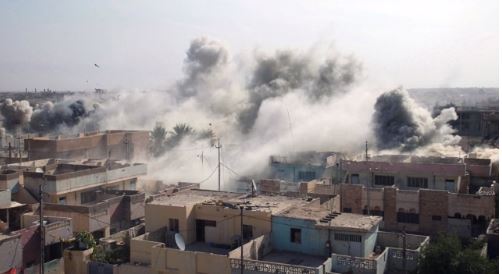Ten Years on, the US is Helping to Destroy Fallujah Again
by Mike Phipps
The Iraqi Government’s accusation of an external Al-Qaeda takeover was made to justify a ferocious siege and bombardment of the Fallujah and Ramadi.
Conflict and carnage on a scale unseen since the height of the Occupation nearly a decade ago have broken out in Iraq’s Anbar Province. Over 140,000 people have been made homeless since fighting started at the end of last year. According to the UN, 65,000 people fled the fighting in the towns of Fallujah and Ramadi in one week alone.
Some commentators see the violence as a spillover from the Syrian conflict. Others analyse it in terms of Sunni tribesmen in dispute. When Iraq’s corrupt government earned a rebuke from the usually inert UN Secretary General Ban Ki-Moon, who called on Nuri al-Maliki to address the root causes of the conflict, the Iraqi prime minister retorted, “We do not hold dialogue with al-Qaeda.”
The pernicious narrative, peddled by the Iraqi Government and picked up in the mainstream media, that Al-Qaeda had taken over Fallujah, was a long way from the truth. But it helped to secure an immediate delivery of arms to the Iraqi regime from its US puppeteers to help quell the protests in Anbar.
For protests is what they are. They began over a year ago, demanding the freeing of tens of thousands of detainees held without charge by the security forces. Brutal torture and rape – regardless of gender – are widespread in Iraq’s jails. Last year alone, the state executed 169 people, putting it third in the league behind China and Iran.
The Iraqi Government’s accusation of an external Al-Qaeda takeover was made to justify a ferocious siege and bombardment of the Fallujah and Ramadi. As Iraqi activist Haifa Zangana has pointed out, “Al-Maliki selectively chooses not to mention the regime’s own militias: Asaib Ahl al-Haq, Iraqi Hezbollah, the Badr brigades, factions of the Mahdi army and the Mokhtar army. The latter’s leader has bragged on Baghdadiya TV, about their responsibility for several attacks. No investigation has been done and no one was arrested. There is also hardly any mention of the Iraqi Special Forces inherited from the occupation, especially trained by Colonel James Steele under US ambassador John Negroponte and attached now directly to al-Maliki’s office. Above all, there is no mention of the plethora of foreign-led special operation agents, private security contractors, and organised networks of professional killers, some of whom, many Iraqis believe, are protected by the regime, in the shadow of the US’ biggest embassy in the world, in the fortified green zone in Baghdad.” http://www.aljazeera.com/indepth/opinion/2014/01/here-list-real-forces-behind-violence-iraq-201411613100570815.html
Government shelling of the towns in Anbar Province has been intense. Human Rights Watch has accused the regime of “indiscriminate mortar fire in civilian neighbourhoods” and “killing its own citizens unlawfully”. http://www.hrw.org/news/2014/01/09/iraq-protect-anbar-residents-abuses. Hundreds of people have been killed and more than 200,000 displaced.
The Pentagon is considering following up its arms shipments with the deployment of more troops in the region to train Iraqi forces. This would be fitting, given the atrocities the US military inflicted on this unhappy country along with a deliberate sectarian set of state institutions. It is almost ten years since the first round of collective punishment was inflicted on Fallujah – by US forces.
The 2004 bombardment was a war crime. NGO’s and medical workers estimated that between 4,000 and 6,000 mostly civilians were killed. In addition, 36,000 of the city’s 50,000 homes were destroyed, along with 60 schools and 65 mosques and shrines, and up to 200,000 residents were forced to flee.
Months later, the US admitted that it had used white phosphorous as a battlefield weapon in the assault on Fallujah. A documentary on the Italian RAI channel showed images of bodies recovered afterwards, which it said proved the incendiary, similar in effect to napalm, had been used against men, women and children who were burned to the bone. Unconfirmed reports suggest the Iraqi regime is using similar munitions this time around.
One commentator who has seen through the current misinformation is former US marine Ross Caputi. Writing in The Guardian, he said,
“I am having flashbacks to my time as a marine during the second siege of Falluja in 2004. Again, claims are being published that al-Qaida has taken over the city and that a heavy-handed military response is needed to take the city back from the control of terrorists. The first time around, this claim proved to be false. The vast majority of the men we fought against in Falluja were locals, unaffiliated with al-Qaida, who were trying to expel the foreign occupiers from their country. This week, the Iraqi Ministry of Interior’s assertion that al-Qaida’s affiliate, the Islamic State of Iraq and Syria, has taken over half of Falluja is being parroted in headlines by almost every major media network. But again, it appears that the role of al-Qaida in Falluja is being exaggerated and used as a justification for a military assault on the city.”


